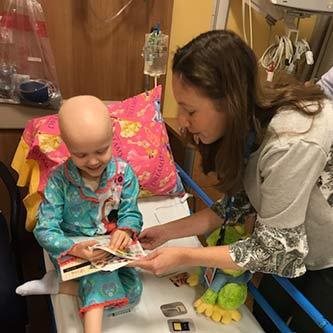 Certified as a child life professional, Laura Drap provides child life services to pediatric patients and their families while they are in treatment at Texas Center for Proton Therapy.
Certified as a child life professional, Laura Drap provides child life services to pediatric patients and their families while they are in treatment at Texas Center for Proton Therapy.
What made you choose your position?
I always knew I wanted to work with children in some capacity. In college, I was exposed to the area of child life in the hospital setting. From there, I changed my major, started volunteering in child life programs, and immediately knew I wanted to pursue a career as a child life specialist.
What is your role?
I work alongside the medical team to help provide psychosocial support to children and families undergoing radiation and proton therapy. As a child life specialist, it is my role to help reduce the stress and anxiety that is often associated with illness and medical procedures. I am able to help children prepare for and cope with the treatment process by providing opportunities for education, procedural preparation and support, and various recreational play and medical play opportunities. It is my goal to help make the treatment process as child friendly as possible which helps normalize their daily visits.
At what point do you interact with newly diagnosed patients?
I meet pediatric patients and their families at their first consultation. After reviewing the medical aspects of each child's diagnosis, I want to learn more about the individual and unique needs of each child so I can begin tailoring our interventions to help make the treatment process as smooth as possible. Prior to starting treatment, I will also meet the child at their CT simulation to provide them with age appropriate support and coping techniques and help assess whether the child will be able to hold still for treatment. Each child's journey may look a little bit different, but I am with them throughout the treatment process from beginning to end.
What are some of the unique challenges of treating pediatric cancer patients?
And how does that differ from treating adult patients? Children aren't just smaller people, they have unique individual needs and are still developing and growing. It's important to explain procedures and treatments in ways that children and siblings of all ages can understand. Younger patients can benefit from things such as using medical play, teaching dolls, and visual demonstrations, while teenagers with a higher maturity level may prefer more technical explanations.
Why are these activities important for pediatric cancer patients?
Play is the universal child's language – play is healing. Although the options for patients differ by developmental level, every activity is designed to help our patients learn to cope with their treatment. As a child life specialist, I want to ensure that our children take the time to process and reflect upon their experience so they are able to see the progress they are making and the challenges they are overcoming. We celebrate different milestones throughout their treatment journey and on their last day we have a small completion ceremony to recognize this special occasion. It's an uplifting occasion where children can ring the gong and paint their handprints on our canvas wall that is on display in our playroom.
How do you see patients' attitudes change throughout your time supporting them?
I remember a 4-year-old who didn't even want to walk in the building. She was so nervous and scared. Slowly, she began to know us and trust us. Before you knew it, she couldn't wait to come in each day for her treatments. Giving children the skills they need to be able to walk out of treatment with their heads held high is very empowering and rewarding.
How do you see parents' attitudes change?
It's just as important that the family has a good understanding of the treatment process. As a parent, it's understandable to feel anxious. Children will pick up on those nerves, even at a very early age, so it's important that we provide quality, family centered care.
What has treating pediatric cancer patients taught you about resiliency in the human spirit?
These children are so brave – they are the definition of fighters – and I have the privilege of witnessing this every day.